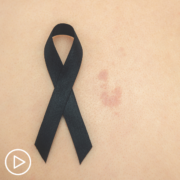When Should Clinical Trials Be Considered for Advanced Non-Melanoma Skin Cancer Treatment? from Patient Empowerment Network on Vimeo.
When should clinical trials be considered for advanced non-melanoma skin cancer treatment? Dr. Anna Pavlick explores the role of clinical trials, common patient concerns about participating in trials, and the phases of clinical trials in cancer research.
Dr. Anna Pavlick is a medical oncologist and the founding Director of the Cutaneous Oncology Program at Weill Cornell Medicine and NewYork-Presbyterian. Learn more about Dr. Pavlick.
See More from Evolve Non-Melanoma Skin Cancer
Related Resources
Transcript:
Katherine:
Where do clinical trials fit into a treatment plan for advanced non-melanoma skin cancer?
Dr. Pavlick:
Again, my feeling is that clinical trials are opportunities for patients to be able to not only get the standard of care because many of our clinical trials offer patients the standard of care which is immunotherapy.
But then we look to add something. And by adding something, can we make the responses faster, better, more durable? And that’s why asking your oncologist or your dermatologist about is there a clinical trial that I may be eligible for may make a huge impact on what happens.
We talked about immunotherapy. We talked about the targeted therapy. There are clinical trials that are now looking at injecting tumors with viral vectors. So, by injecting, we’re using the herpes virus which is the cold virus and injecting that directly into the lesion. Can that generate a better immune response to make things shrink up faster and provide more durable responses?
And so, those are very exciting things. Most of these non-melanoma skin cancers have not metastasized. And even if they have, we’ve seen that if you inject the lesion that’s cutaneous, even if you have something that’s deeper, by really stimulating an immune response, you can not only contain the lesion that you’re injecting, but you will get a reciprocal response in the other lesions as well. So, it’s really a neat concept that’s really coming to fruition.
Katherine:
What would you say to a patient who is hesitant in participating in a trial?
Dr. Pavlick:
What do you got to lose? Patients are always very concerned that when they participate in a trial that they will get a placebo.
Katherine:
Yeah.
Dr. Pavlick:
And I think that’s the biggest hesitation and the biggest concern for many patients.
And that has to be spelled out in the trial. The trial is going to say this is a trial where half of the patients are going to get a placebo or half of the patients are going to get X medicine. It is exceedingly rare in a treatment trial that there will be a placebo arm. Many times, if you’re talking about prevention, those are the studies that will want a control arm to get a placebo because the standard of care is you take this out, you do nothing and you watch.
Well, if you’re looking to see if doing something versus nothing is better, then they’re going to tell you. The standard is care is that we do nothing. However, in this trial, half the patients are going to get watched and get the standard of care.
The other half of the patients are going to get either drug X or drug Y. And then at the end of the study, we’re going to see if those medicines actually benefited or didn’t benefit those patients compared to the patients who were just watched. Most patients who have active disease, whether it be locally advanced or metastatic are going to be offered trials that are either what we call a Phase I, a Phase II or a Phase III study.
So, a Phase I study is where we’re taking a brand new medicine that’s coming from the lab that looks to be very exciting. And we’re looking for what the side effects are and what is the right dose. So, it’s a very early trial where we’re not even sure what the toxicity is or what’s the right dose.
Once we complete Phase I studies, we then get the information. So, we know the right dose. We know the side effects. We move onto a Phase II study. So, a Phase II study is where we’re going to look at a particular type of cancer and say everybody gets this drug at this dose and we know what the side effects are. We are looking to see if it truly is efficacious because from our very early research in the Phase I studies, we saw a group of patients with this particular type of cancer have a really nice response. And so, we’re looking for the efficacy of a drug in a Phase II study. So, everybody gets treated. If we find something in the Phase II study that is a slam-dunk oh, my goodness, this looks terrific, we then go on to a Phase III study.
And so, a Phase III study is a randomized trial meaning half of the patients get one treatment. Half of the patients get the other treatment. Many times, I don’t get to pick what the patient gets. The patient doesn’t get to get what the patient picks. It’s randomized, but everybody gets a treatment. And Phase III studies take this new drug that we saw and got very excited about in the Phase II study, and we’ll compare it to the gold standard or the current standard of care for that particular disease. And then we compare the standard to the new treatment and see who wins. And that’s how we advance our learning. We advance what we do for people with this disease because if the new treatment does better than what we’re doing for everybody else, well now everybody else is going to get the new treatment.















